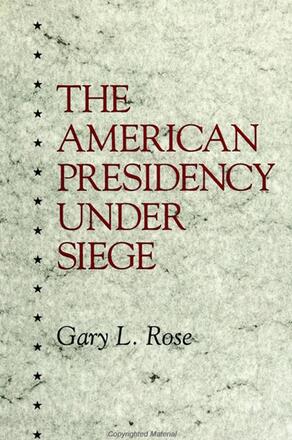
The American Presidency Under Siege
Alternative formats available from:
Attributes the failure of the modern presidency to the development of a political system that inherently impedes creative leadership, and offers prescriptive measures to restore the governing capacity of the president.
Description
This book explores the failure of the modern American presidency, a failure the author attributes to the development of a political system that impedes creative leadership. The American presidency, Gary L. Rose argues, is under siege. Surrounded and blockaded by a reactionary Congress, an entrenched bureaucracy, an aggressive media, lobbyists, political action committees, and special interest groups, American presidents fail not because of a lack of ability or character but because of the political system and style of politics inside the Beltway.
Rose ascribes this emergence of a political system that obstructs presidential leadership to the decline of political parties as electoral and governing mechanisms. As political parties have declined, presidents have lost vital political connections that historically have enhanced their capacity to lead. He presents a variety of prescriptive measures, including political-party and legal reform, that have the potential to restore political parties and the governing capacity of the presidency.
Gary L. Rose is Professor of Political Science at Sacred Heart University in Fairfield, Connecticut. He is the editor of Controversial Issues in Presidential Selection, also published by SUNY Press, and the author of Connecticut Politics at the Crossroads.
Reviews
"Rose's book is a useful read for anyone who teaches American politics … It is also an excellent book for advanced undergraduate students, who will appreciate Rose's systematic analysis of the presidency in the context of current political realities … Rose has produced a wonderfully readable and interesting book … Its focus on systemic aspects of the presidency is a refreshing change from the usual obsession in popular culture with individual presidents and their personal strengths and weaknesses. " — H-Net Reviews (H-Teachpol)
"The unique quality of this book is the manner in which it presents the problems of the presidency and the exciting manner in which it chooses among the various reforms presented. The result is a very readable and stimulating book on the presidency. It will take its place with Cronin's The State of the Presidency and Rethinking the Presidency as an important work in presidential studies, but it will stand alone because of its critical and prescriptive character. " — Robert D. Loevy, Colorado College
"This book fills an important gap in the literature on both the presidency and parties. The most original and provocative parts of the book concern the author's proposals for reforming the national conventions in order to revitalize them as decision-making, federal bodies, and thus to simultaneously de-emphasize the role of candidate-centered, party-weakening primaries. Also, I am intrigued by the fact that Rose elaborates on the role of patronage in party-building and explores patronage reform for the purposes of both strengthening the parties and helping presidents govern more effectively. " — Sean J. Savage, Saint Mary's College
"Extremely well-written and especially geared toward undergraduates. A real gem!" — John Kenneth White, author of Seeing Red: How the Cold War Shaped American Politics